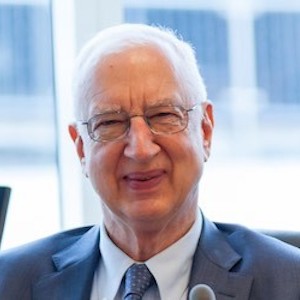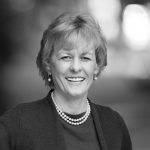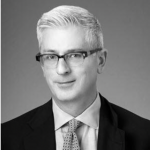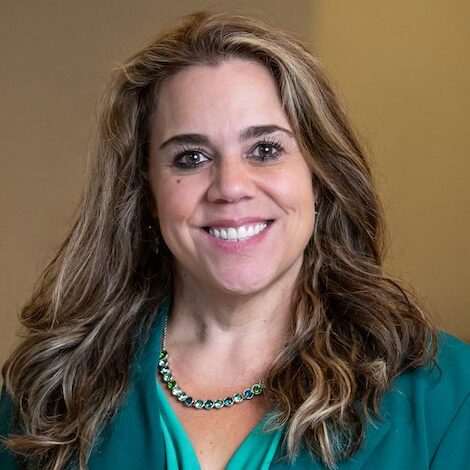
In November, the UIC John Marshall Law School held their 64th Annual Intellectual Property Conference. The program consisted of five plenary sessions and nine breakout sessions featuring candid discussions and networking sessions with judges, senior government officials, and leaders of supranational IP offices, multinational corporations, law firms, academia, and nonprofit organizations. IPWatchdog’s Founder, Gene Quinn, moderated the first plenary session, “The State of Patent Law & Policy: Views from the Top.” Click Here for full event and speaker details.
The program kicked off with a keynote address by the Honorable Paul Michel (pictured left), former Chief Judge of the U.S. Court of Appeals for the Federal Circuit. Titled “Balance and Rebalance and Rebalance Intellectual Property Policy,” Judge Michel first identified four areas in patent law that need urgent reform in the U.S. – 1) Section 101 on eligibility “that is so unpredictable, difficult to apply, yields inconsistent results,” 2) injunctions, “which are now much more difficult to get, particularly for certain parties,” 3) the Patent Trial and Appeal Board (PTAB) and the procedures and balances there that may “be unduly tilted against the patent owner and in favor of the challenger,” and 4) litigation costs, “not only in dollars but in delay and uncertainty and the disruption from massive discovery.”
In contrast, Judge Michel praised U.S. trademark litigation as “much faster, less costly, and finally decisive, very often settled on summary judgment. The result then is either a voluntary settlement at a very early date at a relatively low cost or a quick injunction that then prompts a settlement.” According to Judge Michel, the copyright system “may be not quite as efficient and effective as the trademark regime, but is still quite good and much better than the patent regime in terms of producing practical, beneficial results.” He noted “some areas of substantial lack of clarity concerning the extent of the fair use doctrine, and even copyrightability, as is exemplified by the current Oracle v. Google suit.” Trade secrets was also problematic “because the trade secret owner has to prove that it took reasonable precautions to protect the secrecy, and that is going to be difficult to do in an era where virtually all computers are hackable, most have been hacked, and, therefore, it raises questions about whether if you put your trade secrets on even an internal company computer, are you taking adequate precautions or not.”
Judge Michel outlined five key questions for stakeholders to consider:
- What is the comparative advantage of Article III courts, Congress, the Patent and Trademark Office, or related entities in the Executive Branch in addressing IP issues?
- Is litigation of patents in Germany or England, or even China, preferable to litigating in the United States because the results there are much faster, much cheaper, much more predictable, and more advantageous in other ways?
- Does our unitary patent system work well enough for all the different technological areas? This question includes considering how feasible it is “to Balkanize the patent system according to different technological areas.”
- Does the copyright system work as well for the useful arts as it does for the creative arts?
- Do any of the four intellectual property rights regimes create enough incentive to spur the innovation we need? Judge Michel noted that “vaccines are generally not very profitable for companies and so they tend not to undertake the research and the long development cycle needed, and they get a lower priority.” He wondered if the United States “needed to find some way to work around that problem in order to have vaccines in advance and not be trying to play catch-up, as we are now.”
In summing up, Judge Michel left the audience with a thought-provoking warning.
It seems to me the U.S. Congress, like the courts, is too slow to act, not well understanding the real underlying dynamics, and to me, that suggests that many speakers at this fine conference and peers elsewhere need to make more input and educational effort. Scholars, judges, and especially practitioners, including investors and inventors, need to educate the Congress, educate the courts, educate other public actors, because right now they do not understand the link between intellectual property rights and investment incentives, at least not well enough.
Judge Michel’s full remarks will be published on the conference website later this year, as well as in the UIC John Marshall Review of IP Law.
We asked a group of speakers and attendees to share what they felt was a key message they took from the conference this year. Following are their comments.
 Adraea Brown
Adraea Brown
Director Legal – Trademarks & Brand Protection, Harley-Davidson Motor Company
This was the first time I attended the UIC John Marshall Law School’s Annual IP Conference, but I was immediately impressed with the variety of topics covered as well as the excellent slate of speaking faculty. I thank Daryl Lim, and the entire staff for providing me with the opportunity to speak as part of the in-house perspectives breakout room. While this was a virtual conference, there were still plenty of networking opportunities and the ability to connect with other attendees and faculty. I certainly look forward to attending when with the ability to be in person.
 Dyllan Brown-Bramble
Dyllan Brown-Bramble
Law Student, Georgetown University Law Center
It was my pleasure to attend the UIC John Marshall Law School’s 63rd Annual Intellectual Property Law Conference for the first time. The event was one of the best IP events that I have attended. I really commend Daryl Lim and his colleagues at UIC Law for all of their work to put together such an excellent event! Even being hosted virtually, the team didn’t miss a beat in offering quality presenters and networking opportunities with other law students and legal professionals. This event covered a variety of current IP issues. As a current law student in his final year of law school, I found it extremely helpful to hear about what is top of mind for IP professionals who work in various sectors. The panelists were some of the top academics and practitioners in the IP space, and they engaged in thought-provoking discussions about many pressing issues. I am glad I attended this conference, and I hope to attend the conference again next year.
 Mark Campagna
Mark Campagna
Sr. Director, Patent Portfolio Strategy, Medtronic
I enjoyed the conference, the esteemed speakers, including Judges Newman, Michel and Rader, and the in-depth analysis of substantive patent law that was discussed. The panels addressed hot topics, such as Global IP Issues, FRAND licensing in Europe and the Phase One China deal. The panelists were insightful and provided helpful advice for me and others who must navigate these issues as an in-house IP attorney. The program was well organized, efficiently run in an on-line format and provided useful insights to everyone who attended.
 Lisa Dunner
Lisa Dunner
Managing Partner, Dunner Law PLLC
It was a privilege to attend and moderate a trademark/copyright plenary session at the UIC John Marshall Law School’s 64th Annual Intellectual Property Law Conference. This conference is unique, not only for its great content, but also for the diverse group of leading professionals that make up its speakers. It is truly one of the best conferences around, and the highlight for me this year was to present the first annual Don Dunner Leadership Award to Judge Pauline Newman in memory of my Dad. My Dad loved attending this conference and he would be pleased that Judge Newman was the first recipient of this award.
 Natalie Elizaroff
Natalie Elizaroff
Law Student, UIC John Marshall Law School
UIC John Marshall Law School’s Annual IP Conference is truly an exceptional event. Despite having to reformat and restructure the conference into an online format, the discussions were just as engaging and informative as before. Being online gave me more opportunities to reach out to speakers and attendees without distracting from the ongoing discussions.
This experience never ceases to remind me of the many nuances and niches that exist as part of the IP world. It was interesting to hear about the developments in IP law regarding Covid-19, artificial intelligence, and the digital marketplace. Likewise, hearing commentary on high-profile cases such as FTC v. Qualcomm and Google v. Oracle gave me a better perspective on how professionals are preparing to handle future change.
I hope to return for many years to come because this conference encourages thoughtful and stimulating conversation among the brightest minds in IP.
 Hon. Dr. Klaus Grabinski
Hon. Dr. Klaus Grabinski
Judge, German Federal Court of Justice
The 64th UIC John Marshall Law School Annual IP Conference provided a one-day opportunity to gain a full overview of the latest developments in IP law in the US and overseas. It brought together academics, judges, government officials, stake holders and practitioners. All areas of IP law were covered from patent and competition to trademark and copyright law. The format was, for the first time, online instead of a face-to-face event due to covid-19 restrictions. Whether this will be the future or whether the conference will return to become an on-site-event again or whether a hybrid format will establish itself, remains to be seen. In any event, Professor Daryl Lim’s event is one the IP conferences not to be missed.
 David A. Haas
David A. Haas
Managing Director – Disputes, Compliance, & Investigations, Stout Risius Ross
Congratulations and many thanks to Daryl Lim and his team at UIC John Marshall Law School for curating such an interesting and timely IP program. I have attended a few other virtual conferences this year, but none were as well executed as the 64th Annual Intellectual Property Law Conference. I was particularly impressed with the breadth of programming, including: both practice and policy discussions; views from the bench, the C-suite, and outside counsel; U.S. and international issues; and coverage of all forms of IP. The speakers and panelists were highly experienced and credentialed. Plenary session speakers were all respected IP thought leaders. My trademark panel was comprised of a European judge, two in-house counsel representatives, outside counsel, and a financial consultant, each of whom provided unique perspectives on the topics discussed – the impact of corporate social responsibility initiatives on brands, effects of the pandemic on trademarks, current legislative initiatives, and recent rulings by the U.S. Supreme Court and European courts. Virtual networking breaks were easy to use and allowed participants to seek out specific attendees or just join a random “table.” Also, due to the virtual nature of this year’s meeting, I was able to invite a number of clients from outside the Chicago area to attend – feedback from those clients, all first-time participants, was outstanding.
 Gordon Humphreys
Gordon Humphreys
Chairperson, First Board of Appeal, European Union Intellectual Property Office
Having attended the Annual Intellectual Property Law Conference at UIC John Marshall Law School last year, I was honored to be invited back a second time. When I first saw that I would be the only European sitting on a panel of US trademark experts, I feared that I might be somewhat of an outlier. Fortunately, any trepidation I might have felt was banished by the commonality of challenges that we face in the global trademark community. Topics like the ramifications of the pandemic for trademarks brought up some familiar themes like possible residual brand goodwill of businesses that will not make it through the economic meltdown that is currently following hot on the heels of the worst worldwide health crisis in living memory. Even though some trademarks will disappear, competitors will probably not be so anxious to appropriate names that resurface in the public domain because they disappeared for a reason – lack of economic success. Similarly, the Supreme Court decision in booking.com has some interesting take-aways for Europeans, who have rather underdeveloped case law on the subject of genericity. This side of the Atlantic, our highest courts continue to struggle with issues which are familiar to the US legal community, such as broad specifications, lack of intention to use as a ground of bad faith, the role of freedom of expression in scandalous trademarks and registration of cannabis trademarks. This convinces me of the usefulness of a dialogue between both sides of the Pond.
[The views and opinions set out in the statement above do not represent the views and opinions of the EUIPO, but are the personal views and opinions of the author.]
 He Jing
He Jing
Founder, GEN Law
In addition to the wonderful panel discussions, I was pleasantly surprised by the “coffee break” time. I was suspicious about how it would work to interact with other audience after the panel discussions are done. But it turns out that the online format worked very well. We had a very close and productive small group chat. I even invited one of them to another online conference shortly after!
 Sergey Medvedev
Sergey Medvedev
Partner and Deputy Chief of Legal Department, Gorodissky & Partners
It was my pleasure to attend and speak at UIC John Marshall Law School’s 64rth Annual Intellectual Property Law Conference (Conference). Special thanks to Daryl Lim for the invitation and organizing such a beautiful, international IP/IT Conference on such a professional, strong level! Indeed, I enjoyed everything: the content, the speakers and further discussions about various IP and IT topics.
Despite the online format due to the global pandemic situation, the technical part of the Conference worked well and the platform was easy-to-use and quite friendly. Online format is not the worst one for such events, as it appeared.
As a speaker, I was honored to be a panelist of the IT and Privacy session and had a great privilege to talk about data protection and privacy issues in Russia. This was the best session, without any doubts, – a perfect combination of legal, privacy and technology aspects from around the globe!
Will certainly participate in this Conference in the future, if another opportunity arises. I look forward to catching up and attending the event next years!
 Sabina Nedkova
Sabina Nedkova
Law Student, UIC John Marshall Law School
Operations Manager of Trademark Renewals (US), Dennemeyer Group
UIC-John Marshall’s 64th annual conference was unique. It took place in a virtual building with virtual floors and rooms but full of that same enthusiasm for IP it is known for. Even though entirely remote, the conference drew the same amazing group of IP practitioners and innovators as in previous years. The conference guest speakers included private, non-profit, and government representatives from companies and organizations such as Google, Copyright Alliance, EUIPO, Rotary International, Netflix, Starbucks, and WIPO, just to name a few. Hearing both perspectives, private and government, on current issues made the sessions truly dynamic. Especially interesting were the conversations surrounding the impact of COVID on IP rights and the steps government agencies have taken already to assist innovators to fast track patent and trademark registrations.
I was also proud to bear witness to the first Don Dunner Leadership Award being presented to Judge Newman, this year’s worthy recipient. The Award celebrates the life of Don Dunner by recognizing people who have shown leadership in their personal and professional life. Judge Newman is certainly such a person with a wealth of IP experience, willingness to share her knowledge by participating as a speaker and/or panelist at conferences, interacting with students, providing internship opportunities, and so much more.
 Batur Oktay
Batur Oktay
Managing Director and Corporate Counsel, Starbucks Coffee Company
This was my first year attending the UIC John Marshall Law School Intellectual Property Conference. I greatly enjoyed the format, which mixed experts from government, private practice, and business, to create robust and interesting discussions. The speakers were deeply experienced and excellent. I will be back!
 Kevin Parks
Kevin Parks
Shareholder, Leydig, Voit & Mayer, Ltd.
The UIC John Marshall Law School’s Annual IP Conference remains best-in-class. This year’s virtual version went off without a hitch. Cheers to Daryl Lim and his team of administrators and technicians who made it look easy!
As a copyright panelist I enjoyed lively exchanges on an array of topics—preemption; AI authorship and standing to sue; Section 512 updates; and the latest in music licensing. Looking forward to the 65th, whether in person, online, or both.
 Thomas D. Pease
Thomas D. Pease
Partner, Quinn Emanuel Urquhart & Sullivan, LLP
This year’s 64th UIC John Marshall Law School IP Conference was another outstanding event, despite the pandemic-based need to participate virtually. Once again, leading judges, practicing lawyers and professors from around world weighed in on the critical issues that IP practitioners routinely confront in their increasingly global practices. FRAND licensing commitments for global portfolios of SEPs, and the proper means for valuing, licensing, and enforcing such patents, continue to be a pressing issue, particularly as new standardized technologies such as 5G are emerging and new judicial and regulatory decisions, sometimes inconsistent with another, are issued in different parts of the world. The role in IP of Artificial Intelligence (AI) and techniques such as machine learning is also on the minds of many practitioners, as is the constitutionality and continuing vitality of the US Patent & Trademark Office’s inter partes review (IPR) procedures. For those who want an insight into a broad range of cutting-edge IP issues, this one-day conference is again the place to be.
 Gwilym Roberts
Gwilym Roberts
Partner, Kilburn & Strode LLP
I have always been impressed by the huge energy and expertise shown by UIC John Marshall. Their conference is internationally renowned for its quality of presentation and content. This year it surpassed itself by creating a Covid-friendly event which had much of the social side previously found in the real-life events. The platform is excellent, the management was seamless and it was a pleasure to be involved.
Joshua D. Sarnoff
Professor of Law, DePaul University College of Law
It was a pleasure, as always, to be able to participate in the UIC-Marshall Annual Conference. Not only does Daryl Lim always attract top-tier participants to add terrific insight to the discussions, but I was particularly fortunate to moderate a great panel of presenters on “blended issues.” The discussions took us deep into philosophical concerns with the IP system and the need for both better theory and better empirical information to assess how to establish standards in copyright, patent, design patent, trademarks, trade secrets, and related areas.
 Lauren Simmonds
Lauren Simmonds
Counsel, Netflix
This was my second time attending the UIC John Marshall IP Conference, and I was very impressed with the way the event was modified to accommodate COVID-19 restrictions. The innovative software used for the conference allowed for more interaction between attendees and speakers and seamlessly incorporated various networking opportunities throughout the day. The careful planning by Daryl and his team paid off as panels tackled topical IP issues as well as the impact of the pandemic on day-to-day practice.
Dr. Manveen Singh
Associate Professor & Associate Dean (Academic Affairs) Assistant Director of Centre for Intellectual Property and Technology Law (CIPTEL), Jindal Global Law School
The 64th Annual Intellectual Property Law Conference organized by the UIC John Marshall Law School has been one of the most enriching experiences for me amidst the ongoing Pandemic, and all the credit must go to Prof. Daryl Lim and his entire team for putting this mega event together in such uncertain times. With some of the most esteemed speakers from the legal profession, industry and academia, the Conference offered a unique platform for the dissemination of diverse views on the latest developments in the area of intellectual property. It was an absolute privilege to share the panel with Judge Randall Rader (someone whose judgments I read in Law School and now, teach to my students) and present my views on how SEP jurisprudence seems to be evolving in Asia, especially in light of the anti-suit and anti-anti-suit injunctions granted by Chinese and Indian courts in disputes involving patent infringement and the determination of FRAND royalties. The fact that courts around the world and not just in Asia, are willing to grant such injunctive relief, is indicative of the fact that comity might soon become a thing of the past. Having said that, FRAND disputes are no longer constrained to the telecommunications sector. With SEP licensing in the 5G space fast occupying center-stage, a fresh battleground is emerging in the form of the automotive sector, evidence of which is already being witnessed in Germany and parts of the US. The timing of the Conference, therefore, couldn’t have been any better. As an academic, I carry back home a stimulating experience, one that will stay with me for times to come (or at least till I am back at the next one and it gets even better).
 Molly Stech
Molly Stech
Attorney Advisor, Copyright Law and Policy at USPTO
This was my first opportunity to participate in John Marshall’s annual intellectual property conference and I’m delighted to have done so. Unlike the majority of meetings and conferences in the intellectual property space (and, of course, during the pandemic, everything is held virtually), the format is refreshingly dynamic. Speakers do not go through slide decks, but rather engage in timely, interesting, and extremely well-moderated conversation that is as thought-provoking as it is substantive. The speakers and moderators themselves are top-notch professionals from every relevant sector, both domestic and foreign. I especially enjoyed the panel that highlighted USPTO Director Iancu and his reflections on his tenure in the government, and the Copyright Office’s new Register, Shira Perlmutter, as she looked forward to her upcoming opportunities and challenges and how her time at the USPTO as the Director of Policy and International Affairs influences her approach to her appointment as Register. My compliments to Professor Lim and his team on a world class event.
 Randy M. Stutz
Randy M. Stutz
Vice President of Legal Advocacy, American Antitrust Institute
I take my hat off to Daryl Lim and UIC John Marshall for hosting an exceptionally good conference in the midst of a pandemic! One takeaway is that we may be approaching an inflection point in the United States on attitudes toward antitrust theories premised on FRAND breaches by SEP owners. When confronted with competition law disputes implicating intellectual property, the Trump administration’s Antitrust Division has gone out of its way to prioritize IP policy, whether by voluntarily amending a five-year-old IEEE business review letter to downplay hold-up concerns or inserting itself in the Ninth Circuit’s Qualcomm case to steer litigants toward patent and contract remedies and away from antitrust remedies. Yet many are not convinced this approach is correct or wise, and other U.S. agencies and European regulators and courts continue to see a meaningful role for antitrust law when SEP owners undertake dubious licensing practices. As global litigation plays out over the proper scope of FRAND commitments, the appropriate FRAND royalty base, available remedies for SEP infringement, and the jurisdictional reach of rate-setting decisions, it remains to be seen whether U.S. regulators will follow the path charted by the Trump administration or instead coalesce around a more balanced approach.
 Yixiong Zou
Yixiong Zou
Chief IP Counsel, Midea Group
This was my first time attending the event, and I was really impressed with how well organized it is. I have attended other virtual conferences, this one is by far the best organized in terms of preparation. I totally enjoyed the event by listening to all the esteemed speakers. I really appreciate the efforts from the entire team hosting the event, and hope to attend future conferences in person.

![[IPWatchdog Logo]](https://ipwatchdog.com/wp-content/themes/IPWatchdog%20-%202023/assets/images/temp/logo-small@2x.png)

![[[Advertisement]]](https://ipwatchdog.com/wp-content/uploads/2024/04/Patent-Litigation-2024-banner-last-chance-1500x500-1.jpg)

![[Advertisement]](https://ipwatchdog.com/wp-content/uploads/2024/05/Quartz-IP-May-9-2024-sidebar-700x500-1.jpg)
![[Advertisement]](https://ipwatchdog.com/wp-content/uploads/2024/04/Patent-Litigation-Masters-2024-sidebar-last-chance-700x500-1.jpg)

![[Advertisement]](https://ipwatchdog.com/wp-content/uploads/2021/12/WEBINAR-336-x-280-px.png)
![[Advertisement]](https://ipwatchdog.com/wp-content/uploads/2021/12/2021-Patent-Practice-on-Demand-recorded-Feb-2021-336-x-280.jpg)
![[Advertisement]](https://ipwatchdog.com/wp-content/uploads/2021/12/Ad-4-The-Invent-Patent-System™.png)






Join the Discussion
No comments yet.